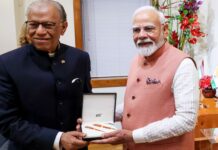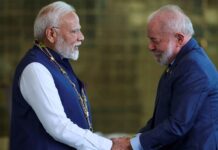LUCKNOW: As Muslims prepare to celebrate Eid-Ul-Adha in 2025, Eidgah Imam Maulana Khalid Rasheed Farangi Mahali issued a comprehensive 12-point advisory on Monday to ensure the festival is observed with hygiene, respect, and social responsibility.
Speaking to ANI, Mahali said, “A 12-point advisory has been issued for Eid-Ul-Adha, where Muslims are advised that while performing the ritual of sacrifice, please maintain hygiene and cleanliness. The ritual should be done on designated spots, not on roadsides or streets.”
He further stressed that the blood of the sacrificed animal should not be shed into drains but buried in raw soil so it acts as fertiliser for plants.
“The blood should not be shed in the drains. It should be buried in raw soil so that it acts as a fertiliser for plants,” he told.
The Imam also requested that no videos or photos of the sacrificial ritual be taken or uploaded to social media.
Eidagh Imam Mahali added, “No video or photo of the sacrificial ritual should be taken or uploaded to social media. Distribute one part of the sacrificed animal among the poor and needy… Pray for the safety of your family and the soldiers protecting our nation on the border…”
The holy festival of Eid al-Adha, also known as the ‘festival of sacrifice’ or Greater Eid, is celebrated on the 10th day of Dhu al-Hijjah, the 12th month of the Islamic or lunar calendar.
Eid al-Adha is the second Islamic festival of the year and follows Eid al-Fitr, which marks the end of Ramadan, the holy month of fasting. The date changes every year, as it’s based on the Islamic lunar calendar, which is about 11 days shorter than the Western 365-day Gregorian calendar. It is celebrated as a commemoration of Prophet Abraham’s willingness to sacrifice everything for God.
According to the Quran, Ibrahim was about to sacrifice his son when a voice from heaven stopped him and allowed him to make something else as a ‘great sacrifice’. In the Old Testament, a ram is sacrificed instead of the son. To mark this occasion, Muslims re-enact Ibrahim’s obedience with the symbolic sacrifice of a lamb, goat, cow, camel, or another animal that is then divided into threes to be shared equally among family, friends and the needy.
Eid al-Adha is called Id-ul-Adha in Arabic and Bakr-Id in the Indian subcontinent, because of the tradition of sacrificing a goat or ‘bakri’. It is a festival that is celebrated with traditional fervour and gaiety in India.
Many Muslims wear new clothes and attend an open-air prayer meeting during Id-ul-Zuha. They may sacrifice a sheep or goat and share the meat with family members, neighbours and the poor. Many Muslims feel that they have a duty to ensure that all Muslims can enjoy a meat-based meal during this holiday. (ANI)







